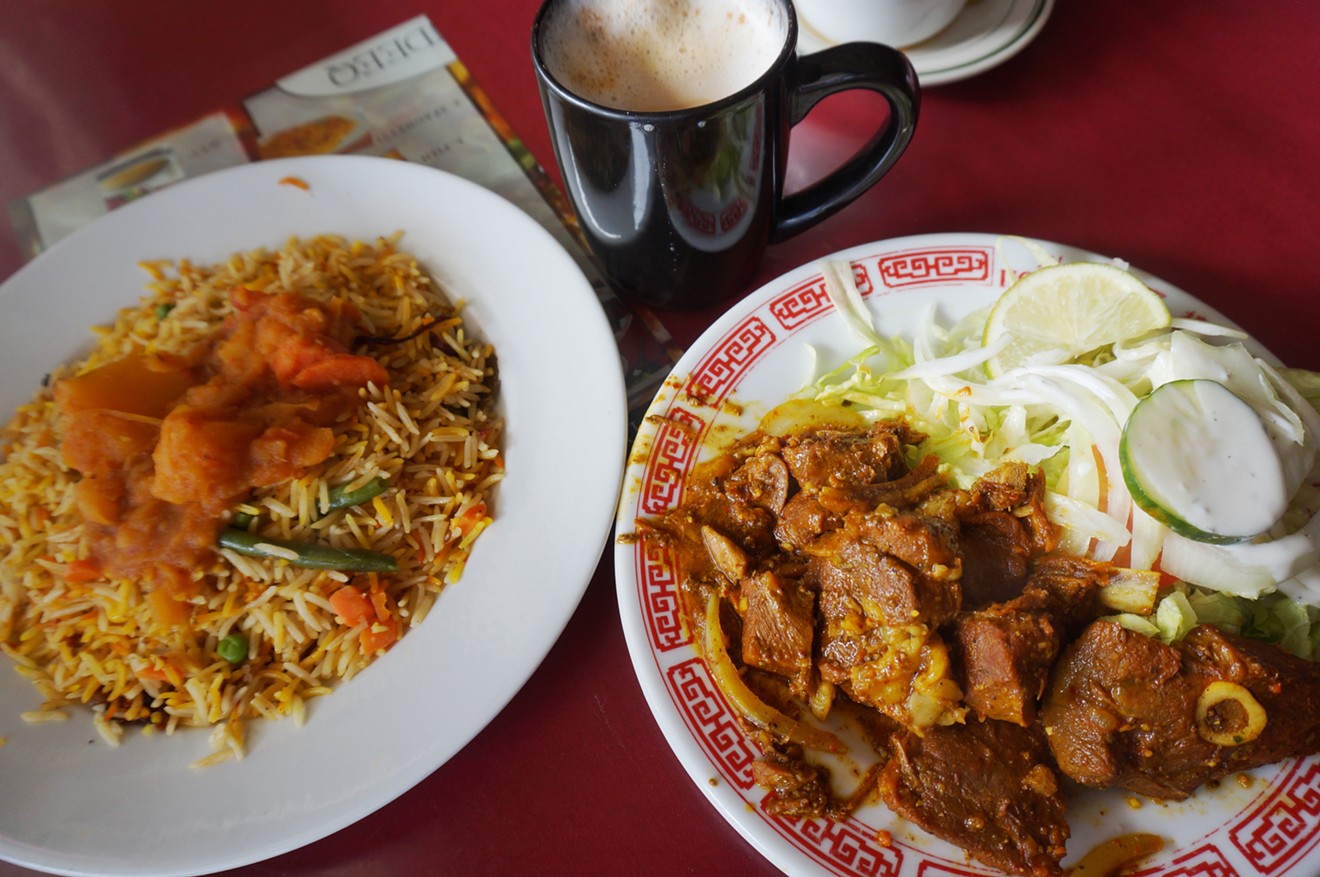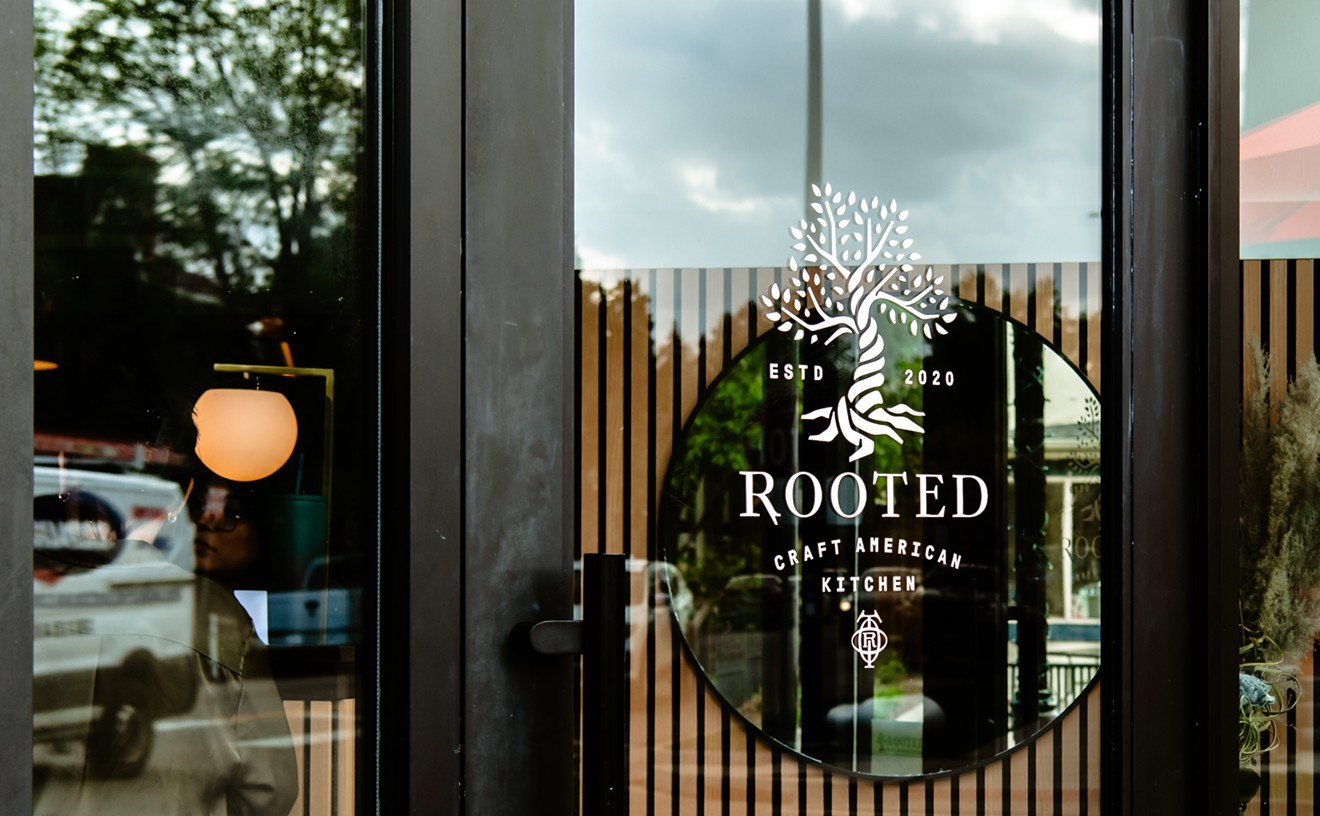Food can be a bridge to sharing and understanding culture, and often paves the way to acceptance of people whose customs are different from those of the majority. President Donald Trump’s January 27 executive order placing severe restrictions on travel and immigration, especially for citizens of Iran, Iraq, Libya, Somalia, Sudan, Syria and Yemen, is currently on hold thanks to a U.S. appeals court, but it could soon be replaced by new regulations written to skirt the court’s ruling. In the meantime, many Colorado residents from the list of banned countries who’ve lived here for years, even decades, have been suffering through anxiety, fear...and worse.
Since Trump issued his order, I’ve been searching metro Denver for eateries and markets that cater to natives of the places on the hit list, getting a taste for the culture of countries that many Americans only know through news stories on war and terrorism. While I was unable to find any Yemeni or Libyan cuisine, I did find good food from the other five nations. Here’s where you can join the banned:
Maandeeq East African Restaurant
1535 South Havana Street, Aurora
720-589-1010
Immigrants from Somalia, many of them refugees from the war-torn land, have found their way to Colorado in large enough numbers that a couple of restaurants have opened to serve the community. One of those is the eight-year-old Maandeeq East African Restaurant, whose menu is filled with dishes similar to what you’ll find in Middle Eastern restaurants, as well as cuisine typical of Somalia and the Muslim regions of bordering countries (including Ethiopia, Djibouti and Kenya). Maandeeq occupies a former Chinese restaurant; the dragon-themed ceiling tiles are a giveaway. Stopping in for lunch one weekday, I join a steady influx of mostly Somali customers coming in for stews, rice plates, chai-style tea and roast goat that the single waiter says is very popular. So that’s what I order, along with rice, a cup of soup and some tea, which arrives creamy and frothed like a cappuccino.
The long-grain rice, sporting a scoop of curried potatoes on top, shares a kinship with Indian biryani and serves as a good stepping stone into Somali cuisine. The deeply spiced goat, stained yellow from a lime-heavy marinade, is as mild as goat gets; still, if goat seems a little intimidating, the kitchen also offers lamb, beef and chicken in similar preparations — or a safe shawarma sandwich robed in chapati-style bread. The restaurant isn’t a polished operation intended to draw food tourists; it’s mostly here for Somalis in need of a taste of home. Sadly, the waiter notes that business has been down since Trump was elected and that times could be tough in the coming year.
Sudan Cafe & Khairat Injera Bakery
10375 East Iliff Avenue, Aurora
303-337-7409
The coffee at the Sudan Cafe comes in tiny metal pots with even tinier cups. A spice, most likely cardamom, is brewed into it, adding an herbal, medicinal note — not bad, just unexpected. But then, there’s plenty of the unexpected at this little cafe and bakery. Among the surprises: black lacquered tabletops with images of chile peppers; the way owner Mekki Idris stops at every table to make sure you’re enjoying your food; the warm injera bread similar to that served in Denver’s many Ethiopian restaurants. All of this comes together to turn the unfamiliar, uncommon trappings of a Sudanese restaurant into a comfortable eatery. Idris has owned the Sudan Cafe for nearly six years and says that business has steadily grown; he’s been able to build his menu from one small laminated card to a multi-page roster of offerings from his home country.
Customers from different parts of North Africa and the Middle East hang out at the Sudan, where they sit and read the paper over lunch, with the background chatter of BBC News on the lone television; other regulars come in for bags of injera or other breads and pastries to go. The cafe has become an integral part of this strip-mall-heavy section of Aurora, even amid the constantly shifting restaurant scene around it. When I say I want to try the housemade injera, the woman at the counter suggests molokhia, a stew served atop the flat, spongy bread. Molokhia is made with jute leaves that thicken the stock, add a dark-green tint and lend a bitter, vegetal flavor, not unlike that of spinach or mild kale. While it isn’t the most beautiful dish (then again, neither is Colorado green chile), the stew is warm and filling and goes well with the dark-tan injera. A side of freshly made hot sauce perks up the dish to green-chile level.
Rice & Kabob Persian Kitchen
1699 South Colorado Boulevard
720-512-2147
While searching for the cuisine of Iran, I came across Rice & Kabob Persian Kitchen on South Colorado Boulevard. I assumed Persian would equate to Iranian, but while the little subterranean kitchen does cover plenty of ground — from the eastern shores of the Mediterranean to the borders of western India — the owner of this counter-service spot hails from Afghanistan, and many of the best dishes on the menu and specials board are also from that country. The Persian part of the restaurant name makes sense from a historic and linguistic standpoint, since the Persian Empire once spread over much of southwestern Asia; the two major Persian languages, Farsi and Dari, are spoken in Iran and Afghanistan. The food doesn’t stick within modern borders, either; instead, the grilled meats, heavily spiced rice dishes and other specialties at Rice & Kabob can be found with various names and configurations in several countries.
The restaurant’s mantoo dumplings are Afghan in origin, but mantu or manti are common in places ranging from Turkey to Saudi Arabia to central Asia. Here, the mantoo are stuffed with ground beef and topped with a Bolognese-like sauce made with more ground beef, split peas, dry spices and a generous hit of lemon. The entire plate is drizzled with a tangy topping of creamy garlic-yogurt sauce. The beef in both the dumplings and the sauce is soft and fine-grained, evidence that the meat is cooked long and low to break it down and allow the seasonings to penetrate. Iranian koobideh kabobs are also available (though Iranians might find them unlike what they’re familiar with), and there are also such ubiquitous Mediterranean dishes as shawarmas, falafel and gyros. Rice & Kabob gets bread for its Afghan dishes from Madinah Bakery & Open Flame Kabab in Aurora, where I recently found a great chicken shawarma sandwich.
Trying the mantoo or koobideh at Rice & Kabob isn’t so much a political act as simply a way to extend welcome and friendship at a time when the message from our executive branch is far less accommodating.
Damascus Grill
2276 South Colorado Boulevard
303-757-3515
Syria was hit particularly hard by Trump’s executive order. While it restricts travel by citizens of the other countries listed, the travel and refugee ban is indefinite for Syrian refugees. The current war in Syria and the ban on incoming refugees directly affects Syrian natives here in Denver, as many of them still have loved ones living in their home country. Damascus Grill owner Mahmoud Kassir, who opened his restaurant in the early 1990s, has been trying to make a difference from Denver. His children Amal and Ousama Kassir have also been active in efforts to gather and ship humanitarian aid for refugees abroad; Amal led a protest at Denver International Airport on January 28 to decry the draconian nature of the travel ban.
The food at Damascus Grill is familiar and comforting, with grilled meats, hummus, baba ghanouj and warm pita bread anchoring the menu. But traditional Syrian specialties beyond the standard Middle Eastern repertoire make Damascus particularly worth a lunch or dinner visit. House-baked bread and a plate of hummus come with dinner service, but adding an order of fatayer — canoe-shaped bread stuffed with meats, veggies and cheeses — would be a good starting point. The weekly special is often a homey chicken stew tinted yellow with saffron and redolent of lemon, garlic and cumin. A generous X of sumac powder atop the stew adds tangy flavor unique to Mediterranean fare. Lamb is always a good option at Damascus, too, either grilled as chops or kabobs or slow-cooked and served atop steamy long-grain rice.
Dining at Syrian restaurants in Denver is a simple way to share a sense of community with those hit hard by war and terror — and to say that those most in need are still welcome here, despite the opposite message being sent by our executive branch.
Zamzam Halal International Market
7449 East Iliff Avenue
303-745-4555
I first visited Zamzam Market, named for a legendary spring-fed well in Mecca, Saudi Arabia, a few months ago; I returned recently to find that the market’s offerings have been expanded, with an olive and pickle bar stocked with unusual finds (including pickled wild cucumbers that curl like miniature pale-green snakes); a cooler filled with many different cheeses; and a butcher counter packed with fresh cuts of beef, lamb, goat and chicken. Other draws at Zamzam, which is owned by Mohammed Almosawi (a native of Basra, Iraq), are the fresh bread and kabobs made every day except Tuesday. The flatbread — big, stretchy circles similar to thick, oversized flour tortillas — is made from 9 a.m. to 3 p.m. and almost always sells out, especially on the weekends, when customers snatch it up nearly as fast as the baker can pull it out of the oven. Kabobs, either ground chicken or a beef-lamb blend, are made from 11 a.m. to 6 p.m., so if you want both the meat and the bread, there’s only a short window of overlap. One of the store’s clerks suggests calling ahead to see what’s available.
These restaurants and markets serving the city’s immigrant population add richness and knowledge to our culinary landscape. We can petition our elected officials to fight what’s happening in Washington, D.C., but we can also show compassion and acceptance by learning about the food of other cultures here in Denver — and get a pretty good meal in the process.
This piece includes portions of earlier stories, as I've eaten my way around Trump's banned list.
[
{
"name": "Air - MediumRectangle - Inline Content - Mobile Display Size",
"component": "12017618",
"insertPoint": "2",
"requiredCountToDisplay": "2"
},{
"name": "Editor Picks",
"component": "17242653",
"insertPoint": "4",
"requiredCountToDisplay": "1"
},{
"name": "Inline Links",
"component": "18838239",
"insertPoint": "8th",
"startingPoint": 8,
"requiredCountToDisplay": "7",
"maxInsertions": 25
},{
"name": "Air - MediumRectangle - Combo - Inline Content",
"component": "17261320",
"insertPoint": "8th",
"startingPoint": 8,
"requiredCountToDisplay": "7",
"maxInsertions": 25
},{
"name": "Inline Links",
"component": "18838239",
"insertPoint": "8th",
"startingPoint": 12,
"requiredCountToDisplay": "11",
"maxInsertions": 25
},{
"name": "Air - Leaderboard Tower - Combo - Inline Content",
"component": "17261321",
"insertPoint": "8th",
"startingPoint": 12,
"requiredCountToDisplay": "11",
"maxInsertions": 25
}
]

















